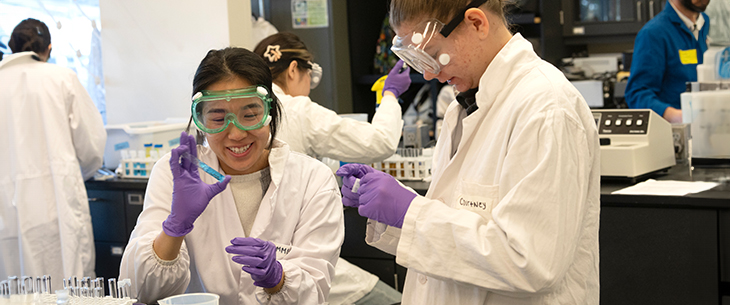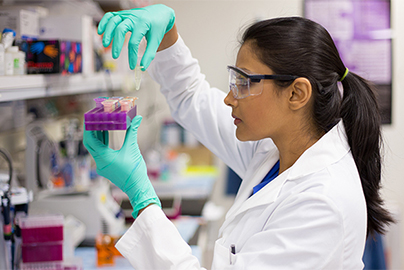Education, Training and Workforce Development
Graduate and Professional Degree Students

Promising Ph.D., M.D., and Master’s scholars can build their knowledge base needed to pursue a career in cancer studies in a supportive and collaborative community.
-
UC Davis Comparative Oncology Training Program
Learn morearrow_forwardOur first-in-the-nation Comparative Oncology T32 program trains the next generation of veterinarian- and physician-scientists, who are interested in cancer research. Preclinical animal models have been the foundation for the development of novel cancer therapies. Historically, this foundation has relied on mouse models. However, tackling complex cancer research challenges should include investigators with broad experience across multiple species. This program provides an outstanding environment to train predoctoral (DVM/PhD) students and post-DVM or post-MD fellows, who are interested in integrating preclinical animal models including companion animals with human cancer biology and drug treatment development. Drawing on UC Davis’s strengths as a research institution, trainees will have access to faculty mentors from the UC Davis School of Veterinary Medicine and School of Medicine as well as the Colleges of Agricultural and Environmental Science, Biological Science, and Engineering.
-
Fellowship Award Writing Course
Learn morearrow_forwardThe F Award Writing Course at UC Davis is a hands-on program for pre- and postdoctoral scholars preparing NIH NRSA applications. Participants will draft, revise, and finalize their grant applications with feedback from peers and mentors, enhancing their grant writing and communication skills.
-
Flow Cytometry Training Course
Learn morearrow_forwardGain in-depth knowledge of flow cytometry principles and best practices through an online training course. The course introduces graduate students, new investigators and industry scientists to instrumentation in interactive lab sessions.
There are many additional training grants at UC Davis that can support cancer-interested trainees. Opportunities are listed by Graduate and Professional Degree programs below.
-
MuSCLE T32: Training Program in Musculoskeletal Health Research
Learn morearrow_forwardThe MuSCLE T32 program is designed to mold predoctoral students into graduates equipped with the skills and knowledge essential for supporting MusculoSkeletal (MSK) health. The program emphasizes team mentoring, and brings together experts in biomedical engineering, materials science, immunology, and both basic and clinical faculty.
-
Advanced Training in Environmental Health Sciences
Learn morearrow_forwardStudents receive faculty mentorship from researchers in a variety of departments, including toxicology, molecular biology, cancer, genotoxicity, metabolic disorders, epigenetics, and more. This program utilizes the resources and research of multiple UC Davis centers to promote and synergize approaches to disease prevention and public health.
-
UC Davis Training Program in Chemical Biology
Learn morearrow_forwardSupporting students engaged in pre-doctoral training at the chemistry-biology interface, the Chemical Biology Program draws faculty from six different departments and five different colleges. The program prepares scholars for careers in the biomedical workforce with the communication and management skills necessary to direct research programs that integrate approaches across the two disciplines.
-
Comparative Lung Biology and Medicine Training Grant
Learn morearrow_forwardPre-doctoral and post-doctoral scholars will grow into independent investigators through the Comparative Lung Biology and Medicine Program’s interactive research environments, innovative and competitive research themes and projects, and training opportunities.
-
Predoctoral Training in Pharmacological Sciences
Learn morearrow_forwardTrainees explore the concepts of drug discovery and development from target identification into the clinic. Trainees receive focused and student-tailored training in pharmacology principles. The program exposes students to novel drugs and possible therapeutics for cardiovascular, neurological, immunological diseases and cancer.
-
UC Davis enhanced Molecular, Cellular, and Developmental T32 Training Program
Learn morearrow_forwardIn this program, trainees gain a breadth of knowledge, research training, and career skills, that prepares them for a successful career in the national biomedical workforce. The program integrates Graduate Group coursework, Ph.D. thesis research in individual laboratories, and professional development experiences with a set of coherent training activities.
-
Academic Research Careers for Medical Doctors (ARC-MD)
Learn morearrow_forwardThe ARC-MD program provides medical students with foundational skills and professional development that promote a successful career as a physician scientist. The five-year program provides students with research and career mentorship, a unique curriculum, and community engagement within a supportive, longitudinal learning community.
-
Veterinary Scientist Training Program
Learn morearrow_forwardThis program prepares students with dual D.V.M.-Ph.D. degrees to become compassionate and exceptional veterinarian-scientists involved in basic and translational research for the advancement of health in people, animals, and the environment.
-
Students Training in Advanced Research Program
Learn morearrow_forwardThe STAR Program identifies, nurtures, and supports veterinary students through work with faculty mentors in all aspects of veterinary and biomedical research including scientific dialogue and communication, library and literature search and research , laboratory conduct and professionalism, research ethics, and grantsmanship.
UC Davis Comprehensive Cancer Center recognizes and supports scholars in their research through recognition awards and conference travel support. Applicants must be Affiliate Scholars to be eligible to apply.
-
Award of Excellence
Learn morearrow_forwardThis award recognizes undergraduate, graduate, and postdoctoral UC Davis Affiliate Scholars for outstanding research, policy, clinical care, and community impact, granting three annual awards with a certificate and $500 prize.
-
Director’s Fellowship
Learn morearrow_forwardOpen to undergraduate, graduate, and postdoctoral UC Davis Affiliate Scholars, this fellowship supports early-career cancer researchers with $1,500 to lead independent projects and gain experience in proposal writing and funding. Three awards are granted annually in the fields of Integrated Cancer Biology, Cancer Therapeutics, Biotechnology, and Population Sciences and Cancer Control.
-
Graduate Student and Postdoctoral Fellow Travel Award
Applyarrow_forwardUC Davis Comprehensive Cancer Center accepts applications for travel awards to support cancer-related research presentations at conferences or annual meetings. Awards may be used for airfare, hotel, meals, ground transportation, and registration fees. Two awards up to $2,000 for graduate students and postdoctoral scholars are offered annually.
- Award is for U.S. travel only; international travel is not eligible.
- Eligibility: Applicants must be a Cancer Center Affiliate Scholar. If you are not an Affiliate, you may apply here
- Applicants that have access to designated funds (e.g., through a T32), are not eligible to apply.
Our Resources
Explore our Resources Page for cancer research opportunities at UC Davis and beyond, with easy access to ongoing offerings.
View resourcesConnect with Us
Subscribe to Cancer Scholars to receive updates on funding, seminars, events open to pre- and post-doctoral and undergraduate scholars.
Subscribe




